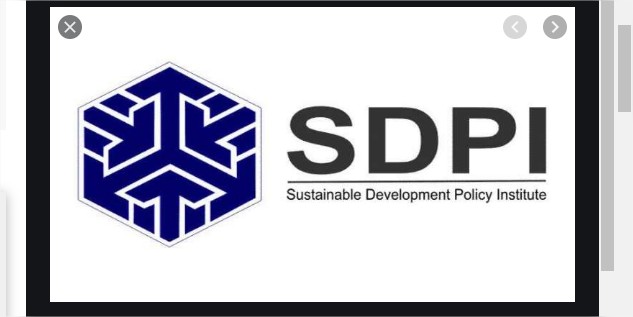DNA
ISLAMABAD, AUG 25 – The export sector in Pakistan has been worse hit due to Covid19 and needs credit and finance support to revive the business and trade. Therefore, all financing schemes should be designed to cater this urgent need of the sector. The experts on business and finance, said this while sharing their views with the participants at online dialogue ‘Credit and Finance Issues faced by exporters amid Covid-19’ organized by the Sustainable Development Policy Institute (SDPI), here on Tuesday.
Senior Joint Director, State Bank of Pakistan, Mr Muhammad Arshad Khan, informed the participants on the occasion that the State Bank of Pakistan (SBP) has increased the financing for exporters. Besides, the long-term financing facility (LTFF) is no more limited to just traditional exporting sectors but also open for potential exporters and new sectors of the economy. In view of Covid-19, he said, the eligibility conditions for accessing Export Finance Scheme (EFS) and LTFF have also been relaxed. Likewise, the collateral free support to small IT exporters in Pakistan is also being considered by SBP and Ministry of Information Technology at the present.
Mr Muhammed Azam, Joint Director, SBP, while highlighting other measures aimed to facilitate exporters, said that SME borrowers have already been allowed one-year extension in repayment of loans. Besides, SBP along with its field offices continues to conduct capacity building and awareness sessions for SMEs to inform them regarding how to access finance.
He suggested that all SME finance institutions should offer advisory services for small business and startups whereas banks should open dedicated hand holding units for SMEs.
Secretary General at Pakistan Textile Exporters Association (PTEA), Mr Azizullah Goheer, was of view that commercial banks also need to enhance dollar denominated concessional lending to exporters. He said that SBP’s local and field offices should interact more with local businesses. Likewise, Covid-19 related financing should be provided in the quickest possible manner, he concluded.
Mr Kamran Arshad, General Secretary of Punjab chapter of All Pakistan Textile Mills Association (APTMA), welcomed Temporary Economic Refinance Facility (TERF) and said that it is better designed than past export financing schemes. However, more facilitation is needed to help exporters who supply to countries worst hit by the impacts of Covid19. He suggested that SBP can initiate its own insurance mechanisms to ensure exporters’ payments and earn revenue through such measures.
Dr Vaqar Ahmed, Joint Executive Director, SDPI, earlier discussed an overarching scenario of facilitation to exporters in Pakistan and said that recent evaluation of SBP’s export financing schemes shows that while these are increasing export receipts, however these schemes are not leading to export diversification. There is also little evidence if these schemes are adding to export sophistication or towards enhancing variety of exports offered by Pakistan. The export financing schemes need to be designed with a view to encourage exporters to find markets in new countries.
He added further that the central bank is currently incurring high costs for offering subsidized export financing that can be lowered by reconsidering the refinance rates offered to the commercial banks. No export scheme should be sector specific and should be opened for all sectors in the economy, particularly potential and new exporters. He said that export financing remains an under-researched area and we do not have much evidence of how this may have impacted growth and productivity in various exporting industries. In this regard academia and policy think tanks could play a role to bridge any data and information gaps that prevent improvements in these finance schemes at a sectoral level.
He underpinned the need for SBP field offices to engage in regular public private dialogue with small exporters and to report back the findings to the head office so that policies are responsive to small exporters in second-tier cities and rural areas. The other area that should be carefully viewed is that that luring foreign investment in Pakistan’s IT industry has been difficult due to lack of export facilitation for this sector, he added.
Mr Fareed Vardag, representing Pakistan Banks Association, said that small exporters still lack knowledge about foreign trade requirements. Export associations should have a help desk to guide with documentation requirements of central bank and commercial banks. Dr Fareeha Armughan, Associate Research Fellow at SDPI, highlighted the fact that the commercial banks are still asking for a proven track record and confirmed cash flows and other documentation from firms in distress. These requirements are harsh if firms are facing cancellation of orders from countries which have still not relaxed their lockdowns. The gender-specific barriers to business and trade still exist that need to be addressed, she concluded.

















